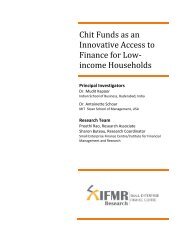Government of India Volume I: Analysis and Recommendations
Government of India Volume I: Analysis and Recommendations
Government of India Volume I: Analysis and Recommendations
You also want an ePaper? Increase the reach of your titles
YUMPU automatically turns print PDFs into web optimized ePapers that Google loves.
ANNEXES<br />
28. Being a social security scheme administered by the government, ESIC should not<br />
be subjected to the entire gamut <strong>of</strong> insurance laws <strong>and</strong> regulations. However, the<br />
law should allow the insurance regulator to identify certain specific principles, such<br />
as those relating to corporate governance, investment management <strong>and</strong> consumer<br />
protection, that would have to be complied with by ESIC.<br />
29. In case <strong>of</strong> government-sponsored schemes that are administered through insurance<br />
companies, the general provisions <strong>of</strong> insurance laws would be applicable.<br />
However, the law should allow the regulator to vary the applicability <strong>of</strong> certain provisions<br />
<strong>of</strong> law, particularly in respect <strong>of</strong> the pre-sale obligations <strong>of</strong> insurers.<br />
30. In case <strong>of</strong> schemes where the insurance coverage is contemplated to be provided<br />
directly by the government <strong>and</strong> the scheme is not funded through a complete or<br />
substantial fiscal transfer, the law will identify certain specific provisions, such as<br />
those relating to corporate governance, investment management <strong>and</strong> consumer<br />
protection, that would have to be complied with by the government body implementing<br />
the scheme. In order for these provisions to be effectively implemented,<br />
the law should m<strong>and</strong>ate that any insurance business carried out by the government,<br />
which is eligible for limited regulation under insurance law, should be carried<br />
out through a separate corporate entity.<br />
31. Life insurance schemes operated by the Department <strong>of</strong> Post (DOP) should be corporatised<br />
<strong>and</strong> brought within the purview <strong>of</strong> the insurance regulator to ensure effective<br />
prudential management, protect the interests <strong>of</strong> policyholders <strong>and</strong> create a<br />
level playing field.<br />
19.6.4. <strong>Recommendations</strong> on retirement financing<br />
Scope <strong>of</strong> retirement financing regulation<br />
1. There should be common regulation <strong>and</strong> supervision for all retirement financing<br />
schemes, including various types <strong>of</strong> pension <strong>and</strong> provident fund schemes, but not<br />
including the unfunded, tax-financed schemes (such as Old Age Pension Schemes),<br />
or those that are largely tax-financed. This would mean that the m<strong>and</strong>ates that are<br />
presently divided between PFRDA <strong>and</strong> EPFO must be brought under one regulatory<br />
agency.<br />
2. EPFO should only manage <strong>and</strong> not regulate retirement financing schemes. EPFO itself<br />
should be regulated in the same manner like any other retirement financing entity,<br />
<strong>and</strong> the entire range <strong>of</strong> regulations should apply to it. Similar approach should<br />
be taken towards PPF.<br />
3. Smaller exempt <strong>and</strong> excluded funds should integrate with Employees’ Provident<br />
Fund (EPF) or NPS. The tax treatment should continue if the fund chooses to integrate<br />
with either <strong>of</strong> the two. The law should not make reference to the possibility<br />
<strong>of</strong> exemption or exclusion, <strong>and</strong> it should m<strong>and</strong>ate all existing funds that fall under<br />
these categories to opt for either NPS or EPFO.<br />
4. The primary objective <strong>of</strong> retirement financing regulation should be to correct market<br />
failures in the retirement financing sector. Development <strong>of</strong> the sector or inclusion<br />
should not be m<strong>and</strong>ates given to the regulator, though the regulator should<br />
have the flexibility to customise the regulation according to the pr<strong>of</strong>ile <strong>of</strong> the consumers<br />
<strong>and</strong> the kind <strong>of</strong> the product being <strong>of</strong>fered, based on cost-benefit analysis<br />
<strong>of</strong> the regulation.<br />
Prudential regulation<br />
5. Prudential regulation <strong>and</strong> supervision <strong>of</strong> retirement financing should be largely<br />
risk-based. Regulator should ensure that investigatory <strong>and</strong> enforcement requirements<br />
are proportional to the risks being mitigated.<br />
170 FINANCIAL SECTOR LEGISLATIVE REFORMS COMMISSION



